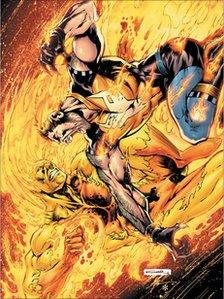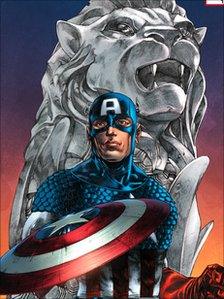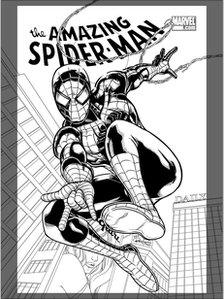Comic giants battle for readers
- Published

In the first few decades of US comics, heroes were mainly white males
A classic battle is brewing in the comic-book industry.
The brawny super-heroes of American comic culture are taking on the starry-eyed Japanese girls of manga.
For the winner, world domination and potentially millions more readers in Asia.
With sales in decline at home, US comic-book giants Marvel and its old rival DC Comics have been looking towards foreign markets to grow their businesses.
"We're pushing to bring new people into stores," says CB Cebulski, senior vice-president and international talent scout at Marvel.
"Sales are down and we've been losing market share to things like video games, social media, to film, to piracy."
Manga dominance
However, Asia already has a rich culture of comics with a dedicated fan base.
Japan's manga, which tends to portray ordinary people as opposed to super-heroes, continues to be immensely popular.
Benjamin Ang says working for Marvel 'is one big cross out of my bucket list'
Domestically the industry was worth 420bn yen ($5.5bn; £3.3bn) in 2009, according to All Japan Magazine and Book Publishers and Editors Association.
It has also grabbed a large chunk of the market in other parts of Asia with titles such as Naruto and Bakuman.
In a survey in 10 cities in the region, manga had more than 50% of the market in Taiwan and Hong Kong, while Western comics had less then 11%, according to market research by Hakuhodo, a Japanese advertising firm.
But sales are falling in Japan as well.
The Japanese government has recently announced a new plan to aggressively further promote its pop culture and content, including manga, to international markets.
'Pushed back'
Meanwhile, the American comic-book companies have been reaching out to new audiences through movie franchises of characters such as Thor, Iron Man and the Fantastic Four.
But even with the help of movies, success is not guaranteed. And Marvel has been burned in the region before.
The company made an aggressive push in Japan and Korea in the 1990s, but by Mr Cebulski's admission, it did not have the formula right.
"We tried to 'bully' our way in and then got pushed back, because we were trying to tell the Asian market what we thought they needed," he says.
"We've always found the Asian market a little bit impenetrable."
One of the reasons could be that Asians have long been under-represented in the comic-book world, both on the pages and in creative roles.
In the past there have been accusations that any characters of different ethnicities tend to be two-dimensional caricatures.

Captain America uses new locations such as Singapore and its Merlion
"The first 35 or 40 years of American comics basically told stories without race, without religion, without ethnicity," says former DC Comics president, and currently senior adviser Paul Levitz.
"Race, in terms of true diversity, was almost non-existent in those first few decades."
But now both DC Comics and Marvel have revamped their strategies in the region.
"To change these things you need to bring in fresh writers, fresh artists with fresh perspectives," says Mr Levitz.
Marvel's Mr Cebulski agrees that giving more creative control to local artists in Asia is one of the ways into the market.
Mixing styles
Benjamin Ang is one of those artists.
The 27-year-old Singaporean has recently been chosen to draw for Marvel, now the biggest comic book company in the US by market share.
Its characters include Spider-Man, Thor and X-Men - Mr Ang's favourite.

Will readers ever want to see an Amazing "Asian" Spiderman?
"I've been a big fan since I was a kid," says Mr Ang.
"My brother collected manga and I collected American comics so we traded, and you can see my style is kind of a fusion of the two."
Mr Ang creates his digital pages and emails them to Marvel. One of his first few jobs was creating the cover for the latest Spider-Man comic.
Mr Cebulski says Marvel wants these artists, as well as those from other parts of the world, to bring their influences into the Marvel universe.
"As the creator base has increased to include more African-Americans, more Asian and more females, they've brought their own sensibilities and wanted to introduce characters that reflect the world they grew up in."
But what really seems to attract readers is not just diverse characters, but making them as real to people here as Super-Man or Batman are to long-time fans in the US.
- Published3 August 2011